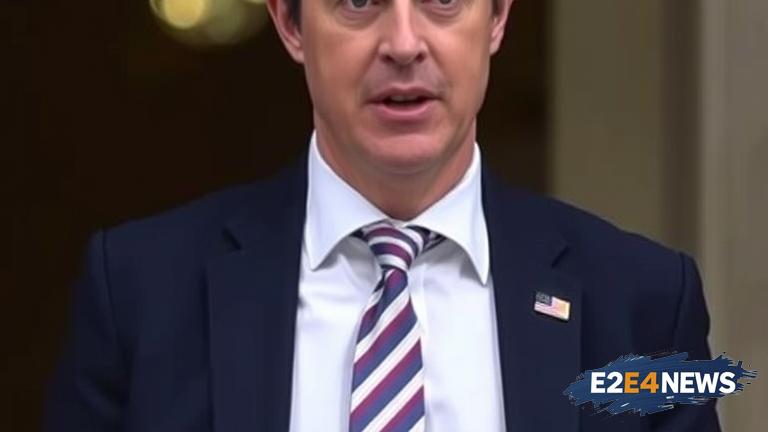Nigel Farage, the former leader of the Brexit Party, has unveiled a new plan to reform the asylum seeker policy in the UK. The plan aims to tackle the ongoing small boats crisis, which has seen a significant increase in the number of migrants crossing the English Channel in recent years. Farage’s proposal includes a number of key measures, including the establishment of a new asylum seeker processing center, the introduction of stricter border controls, and the implementation of a new system for dealing with asylum claims. The plan also includes provisions for increasing the number of deportations of failed asylum seekers and introducing tougher penalties for those who attempt to enter the UK illegally. Farage has argued that the current system is ‘broken’ and that his plan would help to reduce the number of migrants attempting to cross the Channel. He has also claimed that the plan would help to reduce the financial burden on the UK taxpayer, who currently foots the bill for the care and support of asylum seekers. The plan has been met with criticism from some quarters, with opponents arguing that it is too harsh and would lead to the mistreatment of vulnerable migrants. However, Farage has defended his plan, saying that it is necessary to restore public trust in the asylum system and to prevent the exploitation of the system by economic migrants. The small boats crisis has been a major issue in UK politics in recent years, with many calling for tougher action to be taken to prevent migrants from crossing the Channel. The UK government has introduced a number of measures aimed at tackling the crisis, including the deployment of additional border force personnel and the introduction of new technology to detect and prevent migrant crossings. However, despite these efforts, the number of migrants attempting to cross the Channel remains high, with many making the dangerous journey in small, overcrowded boats. The issue has also sparked a wider debate about immigration and asylum policy in the UK, with some arguing that the country needs to take a more compassionate approach to dealing with migrants, while others argue that the system needs to be made tougher to prevent abuse. Farage’s plan is likely to add fuel to this debate, with many seeing it as a key test of the government’s commitment to reforming the asylum system. The plan has also been seen as a way for Farage to reinsert himself into the debate on immigration and asylum, an issue that has been at the heart of his political career. As the UK continues to grapple with the challenges posed by the small boats crisis, it remains to be seen whether Farage’s plan will gain traction and lead to meaningful reforms. The issue is likely to remain a major talking point in UK politics for the foreseeable future, with many calling for a more comprehensive and sustainable solution to the crisis. In recent years, the UK has seen a significant increase in the number of asylum seekers, with many fleeing conflict, persecution, and poverty in their home countries. The UK has a long tradition of providing a safe haven for those in need, but the current system has been criticized for being slow, bureaucratic, and open to abuse. Farage’s plan aims to address these issues, but it remains to be seen whether it will be effective in reducing the number of migrant crossings and restoring public trust in the asylum system. The plan has also sparked concerns about the potential impact on vulnerable migrants, including women and children, who may be affected by the stricter border controls and tougher penalties. As the debate continues, it is clear that the issue of asylum seeker policy and the small boats crisis will remain a major challenge for the UK government, with many calling for a more compassionate and sustainable approach to dealing with migrants. The UK government has faced criticism for its handling of the crisis, with some arguing that it has been too slow to respond and that its policies have been ineffective in reducing the number of migrant crossings. The issue has also sparked tensions with other European countries, with some accusing the UK of not doing enough to prevent migrants from crossing the Channel. As the situation continues to unfold, it remains to be seen whether Farage’s plan will lead to meaningful reforms and a reduction in the number of migrant crossings. The plan has been seen as a way for Farage to reassert his influence on the debate on immigration and asylum, and it is likely to be closely watched by politicians and policymakers in the coming weeks and months. The issue of asylum seeker policy and the small boats crisis is complex and multifaceted, and it will require a comprehensive and sustainable solution to address the challenges posed. The UK government will need to work closely with other European countries and international organizations to develop a solution that is fair, effective, and humane. The plan has also sparked concerns about the potential impact on the UK’s reputation as a safe haven for those in need, with some arguing that the stricter border controls and tougher penalties could damage the country’s reputation as a beacon of hope for refugees and asylum seekers. As the debate continues, it is clear that the issue of asylum seeker policy and the small boats crisis will remain a major challenge for the UK government, with many calling for a more compassionate and sustainable approach to dealing with migrants.




